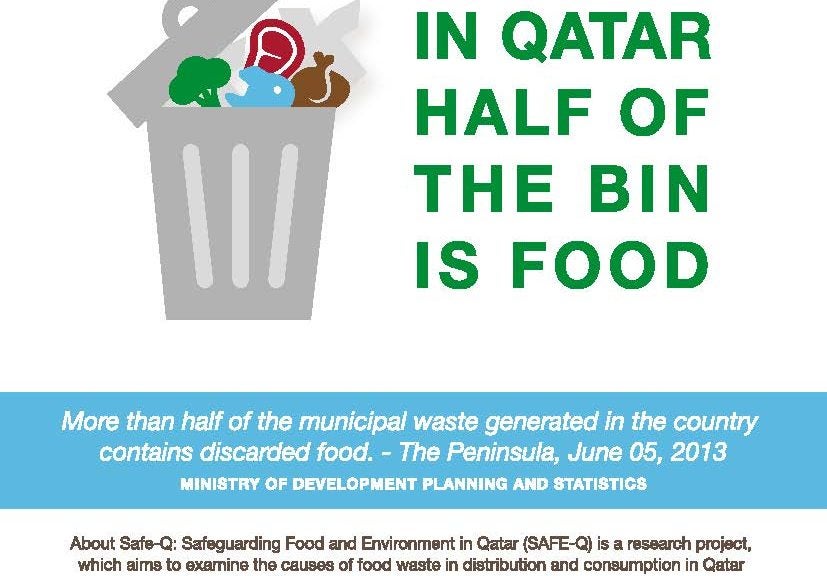Georgetown Researchers Want to Know the Amount of Food that is Thrown Away in Qatar

“Help us by documenting your food waste”, pleads Dr. Zeynep Topaloglu, Assistant Professor at Georgetown University in Qatar (GU-Q) and the Co-Lead Principal Investigator of the Safeguarding Food and Environment in Qatar (SAFE-Q) research project in her invitation to participate in a new research that seeks to identify how much food is thrown away in Qatar and why it is discarded.
“In Qatar, more than half of the municipal waste generated in the country contains discarded food. In a world where 1 in 9 people are hungry, where political unrest and natural disasters are impacting global food security, these statistics are unsustainable and shocking, requiring us to start taking action to understand why it’s happening and to find ways to prevent and reduce food waste,” explained Dr. Topaloglu.
“Hardly any research on food waste has been undertaken in Qatar, so SAFE-Q is trying to fill this gap, by conducting research on food waste at both the distribution and consumption stages of the food supply chain. Georgetown University, in collaboration with partner universities, has already initiated research, which focuses on the supply side. This survey aims to collect the data, which will help us to understand the food waste occurring on the consumer side. We are unable to do this without the voluntary support and participation of the local community,” added the researcher.
On the project’s various online and social media outlets, members of the community in Qatar can find out how to enroll in the voluntary study, which is available in both English and Arabic. The researchers ask participants to fill out multiple surveys over a period of one week about food waste that happens after purchasing it. “Each survey should take around 10 minutes to complete and will be available online. Most importantly, people should know that all data will be collected completely anonymous and that the data provided cannot be linked back to the individual. In fact, after registering, the participants can still choose not to take part in the study or discontinue participating at any time for any reason.”
The benefits of participating, says Dr. Topaloglu, are many. “People who take part in this study will be able to become more self-aware about how much food they waste, and will hopefully realize that it can be avoided. Secondly, and this is the bigger picture, they’re helping to raise national awareness about food waste, and through their survey responses used in this research, they will eventually help to reduce Qatar’s food waste. And considering more than 90% of food consumed in Qatar is imported, that’s a critical contribution.”
Research data, findings as well as lessons learned from this project will also be shared with the United Nations Environment Programme (UNEP), which is currently undertaking a food waste reduction initiative in the Kingdom of Saudi Arabia. The agency coordinates its environmental activities and assists developing countries in implementing environmentally sound policies and practices. It has recently reached out to the SAFE-Q team for their expert advice as well as to look into ways to collaborate on the topic of food waste reduction in the Middle East. Topaloglu says “We were expecting SAFE-Q to have a regional impact, but this collaboration with UNEP facilitates this immediately. Besides the initiative in Saudi, UNEP also shares knowledge generated through SAFE-Q with a global audience through their Think Eat Save campaign. ”
The SAFE-Q project, which is funded by the Qatar National Research Fund, is a 3-year joint research project (NPRP 7 – 1103 – 5 – 156) involving Georgetown University in Qatar (GU-Q), Cranfield University and Brunel University in the UK and the University of Western Sydney in Australia. Anyone interested in finding out more about participating in the survey can visit the project website: https://blogs.commons.georgetown.edu/safeq/